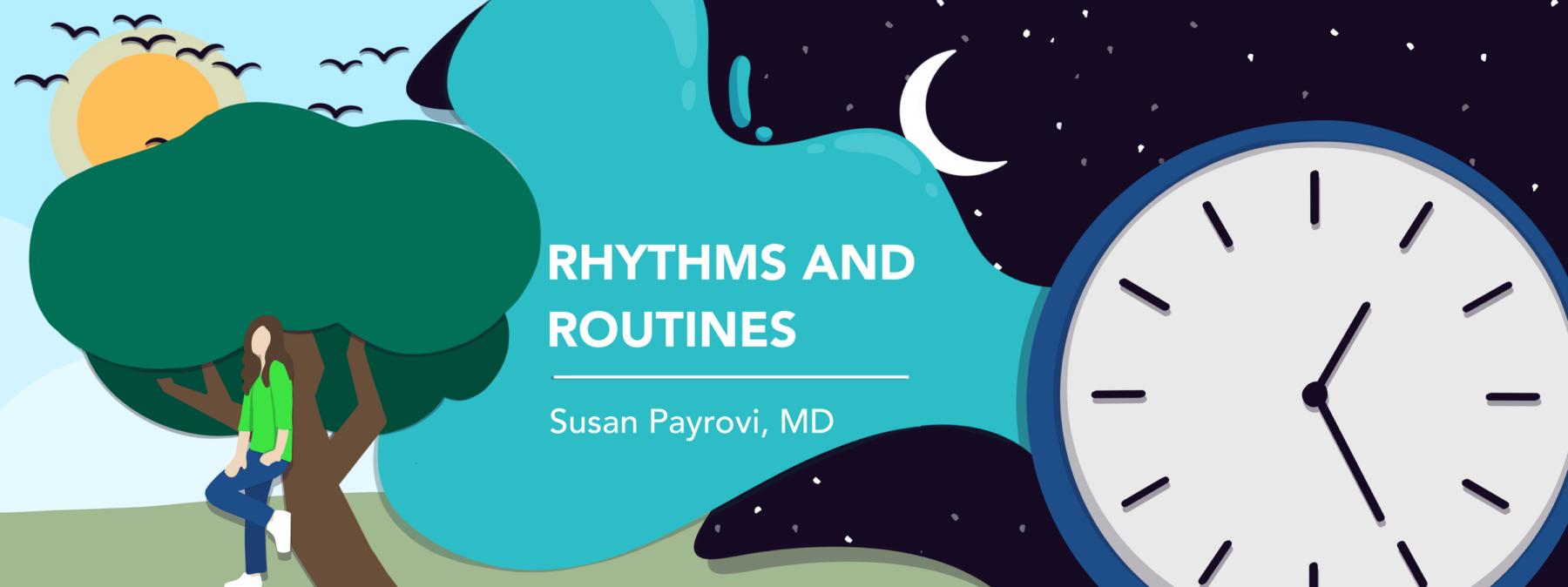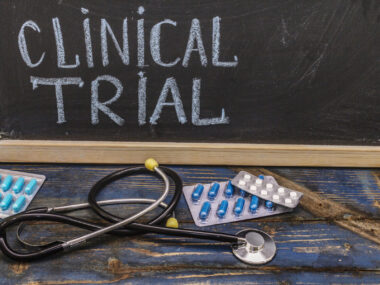Rhythms and routines to complete your MS care
A columnist who's both doctor and patient tells of her diagnosis in debut
Written by |

I used to think I was immune to illness. Getting sick was what my patients did. My multiple sclerosis (MS) diagnosis turned this belief, and many others, upside down. When the chaos of the diagnosis settled, I realized that becoming a patient was the most profound lesson I could have in becoming a better doctor.
I was just a few years out of residency, working over 100 hours a week as an anesthesiologist at a trauma center in Los Angeles. I barely slept. I ate endless amounts of crap food. Taking care of gunshot wounds, stabbings, horrific car accidents, high-risk pregnancies, and the smallest of neonates was my cardio.
After a break to give birth to my first child, I returned to work and, only a month later, quickly realized I had a problem — an uncooperative left arm and hand — at the worst possible times. Now consider that if there’s one body part an anesthesiologist depends on to keep patients safe and alive, it’s the left arm, which is used for placing a breathing tube. I was secretly terrified that I’d hurt a patient in the operating room, so I made an appointment with the first neurologist who would see me.
Long story short, four neurologists over nine months missed my condition. I was told it was tendinitis, the stress of being a new mom, and not getting enough sleep. It was my mentor, a plastic surgeon, who one day blurted out, “You probably have MS.”
And all of a sudden, it all made sense. After all, my arm hung like a lead weight after a hot shower and exercise. There was a waxing and waning pattern to it; one day I was good, the next day I wasn’t.
The MRI confirmed the diagnosis, and over the course of that Memorial Day weekend, I went from being an anesthesiologist to being disabled from practice. It was crushing.
In new role as patient, shifts in career and more
In the aftermath of this news, I was desperate to find a new area of practice that didn’t require a left arm or a long residency program. A late-night Google search turned up integrative medicine, which included a lot of talk about healing. Well, that sounded pretty good because I could use some healing myself!
A conference on the subject changed my life — not just professionally, but also in terms of how I now manage my health, household, and family. I developed a deep belief that if I did what these people said, I could undo some of my MS damage.
So I started eating more vegetables, cut down on sugar, became a regular at the yoga studio, and slept more. It wasn’t easy or quick, but somewhere over two to five years, these lifestyle strategies became routine and second nature.
Doctors told me I wouldn’t make much progress in strengthening my arm beyond the first year or two after the initial attack. But I followed my intuition and what integrative and functional medicine said. I made slow, subtle progress. One day when my son was 7 years old, I got up the courage to go for a run, and my arm did not hang at my side like a lead weight. Dare I say it almost felt normal.
In this column, I want to share with you what this physician-turned-patient has learned over the past decade so that you can focus on implementing the tools that reliably improve health. I want to inspire you to believe in your body’s remarkable capacity to repair and regenerate — if you create the right environment at the cellular level.
Chronic disease, by definition, is not curable. But it can be managed. As we explore routines to get in sync with the rhythms of our bodies and Mother Nature herself, you may notice that you get through your day with fewer symptoms, more ease, and greater joy. And that, my friends, is the definition of healing.
Note: Multiple Sclerosis News Today is strictly a news and information website about the disease. It does not provide medical advice, diagnosis, or treatment. This content is not intended to be a substitute for professional medical advice, diagnosis, or treatment. Always seek the advice of your physician or other qualified health provider with any questions you may have regarding a medical condition. Never disregard professional medical advice or delay in seeking it because of something you have read on this website. The opinions expressed in this column are not those of Multiple Sclerosis News Today or its parent company, Bionews, and are intended to spark discussion about issues pertaining to multiple sclerosis.




Sivan mahadevan
Amazing story and great booster Dr Susan. Wishing you call the best. I have ppms and my leg does not lift. Have completely become vegan and waiting for my miracle day.
Thanks again for these motivational story
Susan Payrovi
Dear Sivan,
Glad you have made dietary changes! There's so much we can do to cope and get through our day better. I'm excited to share more on this topic!
Bruce D Pollard
Hi Dr Susan
Your story is similar in many ways to mine. At least it starts out with a variety of experts not making the MS call. Those years cost me some time before I was on Tysabri and now Ocrevus. There are diferences. I am 71 and my MS is mostly progressive. Still the experimenting with diet and life style changes might have helped some. 12 Years post diagnosis (my issue is left hip flexor and associated region) I still dream of going out for my mornig run or walk. The question for me is how hard should I work at rehab because when I push myself too much I have to deal with some additional recovery. I hope to read some additional episodes of your success with yourself and other anoymous patients.
Susan Payrovi
Hi Bruce,
Thank you for sharing your story and that you've experimented with diet and lifestyle. We can never predict how much someone can squeeze out of these strategies, but it's worth a try. Giving up and letting the disease take its course was just not an option for me.
Rita White
Dr Payrovi,
What a positive article. You should write more about diet and life style.
I have not got MS but have a family member who was diagnosed within few hours attending a large A& E hospital in Melbourne Australia.
I feel in her case probably was due to extremely low vitamin D levels.She purposely avoided the sun , for fear of getting skin cancer.
Thank you for such a a positive article.I hope you are feeling well now.
Susan Payrovi
Dear Rita,
So glad your friend got diagnosed and treated. Sometimes we can address simple things, like a vitamin D level, and improve the health of our immune system. I am looking forward to sharing lots of diet and lifestyle strategies here so stay tuned!
C Ward
Love this article! Perseverance does pay off despite negative so called professional advice! Bravo to you!
susan payrovi
I would say even the negative and wrong comments were made by well-meaning professionals who were doing their best within a diagnostic framework that is not perfect. Hopefully better diagnostic tools are coming into the mainstream.
Cheryl Lynn
Thank you for sharing your story. Well, while not a MD, I am a PhD and when I could no longer think on my feet. I took early retirement. Hopefully you're on a disease modifying drug. I can tell you MS changed my life for the better, I'm happily married, a mother, a grandmother, a great grandmother. At 76 with 33 years of this under my belt, I have no complaints. Kudos to you for figuring out a way to integrate a healthy lifestyle with your education and your family.
susan payrovi
Hi Cheryl Lynn,
What an amazing perspective to be a mom all the way to a great grandmother! I'm grateful to be able to still work, but am also prepared to give it or significantly cut down when needed. Learning to pivot and let go have been beautiful lessons from MS!
Joanna Staudinger
Hopefully this is directed to Dr. Payrovi,
My oldest friend has had MS for 16 years. She seems to be allergic to most drugs and is having a very very difficult time managing the pain. She has done recent imaging showing heavy scarring. Is there anyway we could have a conversation? Thank you so much Joanna Staudinger.
Joanna Staudinger
Dr. Payrovi,
My oldest friend has had MS for 16 years. She seems to be allergic to most drugs and is having a very very difficult time managing the pain. She has done recent imaging showing heavy scarring. Is there anyway we could have a conversation? Thank you so much Joanna Staudinger.
Theresa Halstead
I loved your article. Yes, I feel eating right can really make you feel better. Yes, I take a nap everyday. Mornings seem to be my high energy and then I need a nap to make it through till 9 p.m. I love to swim and do Tai Chi and lift light weights. If I get really tired and do not think I am safe to drive, I will cancel my appointment. I do not want to drive when I am tired.